Many RV owners perceive their solar panels to be self-cleaning with minimal effort and energy from them. The general belief is rainfall, and wind washes away all natures’ dirt. A lot is thrown at the solar panels: Grime, dust, mud, lichen, and a whole lot more. For the panels to work at maximum performance, there needs to be in pristine clean condition.
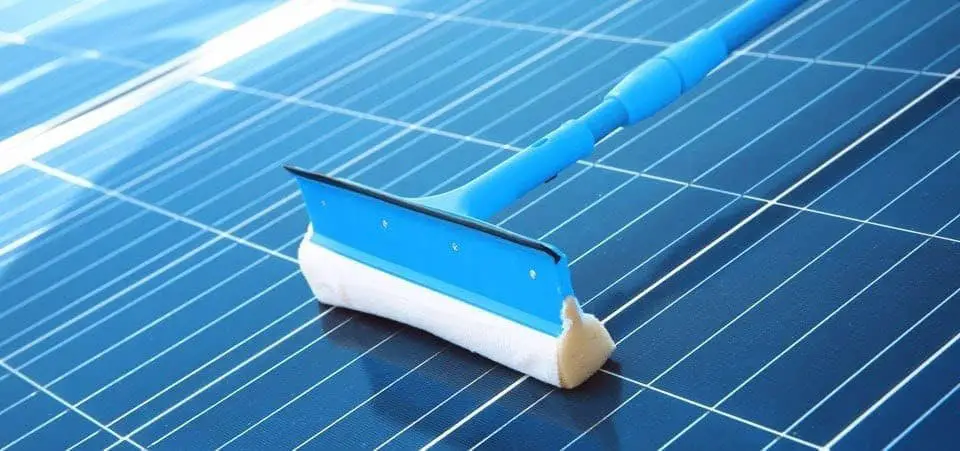
The question to ask is, how do you clean your panels? How often do you clean? I hear you ask, what chemicals and tools do l use? We will answer those questions in this article.
Most solar manufacturers recommend scheduled cleaning of the flexible panel array. To do this, wash the solar surface with clean, lukewarm water and a soft brush or mop. Normal water pressure is adequate from your connected tape. Every-day stains such as fingerprints, oil stains, and dirt on the surface may be removed with over-the-counter cleaners (such as Windex® or equivalent) or 3% soap-and-water solution.
Why Do You Need to Clean Solar Panels?
It improves performance
Schedule maintenance cleaning results in improved power output levels, especially in low rainfall areas.
The removal of dirt and debris on the solar array has a minute impact on the efficient possible a 5% drop in efficiency levels; this is hardly noticeable
It removes dirt and grit
This removes dirt and grime from the solar array, can be achieved by using over the counter chemicals, soapy solution, and some good old elbow grease to make the panels sparkling clean again.
If you’ve parked under a tree with many birds dropping on your roof, it would be a good idea to clean them off as soon as possible. The build-up can be detrimental to the panels’ performance.
It’s a preventive maintenance measure
The rule of the thumb states that a well-maintained and serviced component has a long life. Regular cleaning can alert you if your solar system needs any maintenance. You can quickly discover whether there are mechanical, electrical, or cleanliness issues.
If you decide your solar panels need to be cleaned, there are two main ways of doing it: hire a professional or do it yourself.
It doesn’t cost much
All you need is to schedule a timeslot to get down on your elbows and do some dirty work. You can do the cleaning yourself with just a sponge and some water. You can also use a particular product if you feel the need to.
I recommend this specialist solar panel cleaner concentrate
Related Articles: Is Your RV Roof Turning Black? This Might Be Why How to attach solar panels to a van roof? Best Adhesives for Flexible Solar Panels How Efficient Are Flexible Solar Panels?
How often should you clean your solar panels?
Most
Alternatively, if you van-life in a relatively clan area experiencing regular rainfall, periods between cleaning could be more extended or even unnecessary. In every case, when you have a drop in your energy production, you might want to check if your solar panels are dirty.
Who can clean solar panels?
Any person can clean their solar panels as long as they have the right tools and materials or the basic ideas of how to do rooftop
How much does it cost to clean solar panels?
Not much if you’re doing it yourself; you just need a wet sponge or cloth.
When should you clean solar panels?
Panels are cleaned on an overcast day, especially in the morning or late afternoons, to prevent cleaning products from leaving more residue and protect the panels from cold water used in the cleaning process that can damage the panels. Indeed, you don’t want to throw cold water on a burning hot panel.
Do I need to turn off solar panels to clean?
It is highly recommended to read the instructional solar panel manual that states that the system should be switched off before cleaning. Once this is done, any loose dust and debris are wiped off from your panels with a soft cloth. Using clean water and your sponge or squeegee, remove any stubborn grime and residue from the panels’ surface.
Is it OK to hose off solar panels?
The most effective way to clean your solar panels is with a garden hose and a bucketful soapy water solution. In the same manner, you would wash your car at home; it’s best to use just water and a non-abrasive sponge to apply soapy water so that you don’t scratch the panels.
Can I pressure wash my solar panels?
Try to avoid it as it could damage your solar panels. You want to get up there and clean them with a sponge and a water bucket.
How do you clean your solar panels?
If cleaning from the ground climbing on a ladder, then you can give them a clean yourself. You will need a soft brush or a squeegee brush with a long extension handle and a cloth-covered sponge with a long extension arm to reach the hard to get corners. Use a hose with a suitable outlet nozzle attachment that brings the water stream to your panels’ surfaces.
Five steps to cleaning solar panels
- Inspect your solar panels. Look for physical damages like cracks and fissures. Don’t touch your solar panels if you notice something’s broken (in this case, we highly recommend you to change your panel)
- It is always better to switch off your panels before cleaning.
- Once this is done, wipe off any loose dust, grime, and bird poo from your panels.
- Using only clean water and your soft brush with sponge and squeegee functions, remove any stubborn grime and residue.
- Rinse with clean water and let it dry in a clean area if possible. You don’t want dust to cover your panels while they’re drying.
What NOT to do when cleaning your solar panels
- Don’t use abrasive products. Soapy water is the best.
- Borehole water can leave slimy deposits when it dries.
- Hose your panels from the top surface of your panels, desist from using water on the panels’ rear-side or in the thermal insulation pads between the panels and the roof.
- Don’t attempt to clean solar panels when they are hot – the sudden temperature change from cold water can cause cracking the protective glass layer.
- Use high-pressure water.
Materials and Methods

If the panels are dry, before cleaning the panels with water, wipe off any grime, making cleaning more comfortable and faster.
Don’t scrape off dirt or droppings with metal objects or harsh abrasive chemicals. Avoid using harsh chemicals and detergents if possible, as these may streak the glass of the panel. You just need to use clean water with a sponge and rub the surface of your panels.
Use hard water as a final rinse; then wipe dry with a squeegee.
Dealing with oily stains
If you have oil stains on your panels, l recommend that you use soapy water. Oil stains happen, especially if you park near the highway, airport, railway line, or near a massive industrial zone. Desist from parking near these areas.
Cleaning Bird Poop
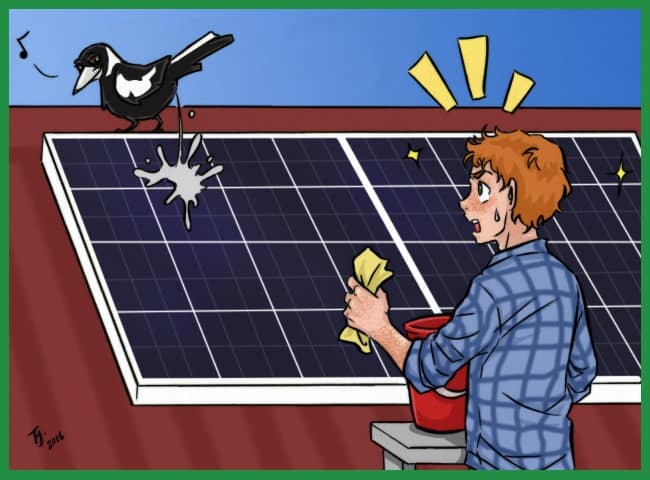
Dust build-up is often cleaned away after some rain showers and is hardly noticeable sometimes, bird poop can stick much longer. You want to avoid that and clean them as soon as possible. You will improve the efficiency of your panels and avoid having a permanent “etching” on them.
Tips for Cleaning Bird Poop off Solar Panels
Tools you’ll need:
- Soap
- A hose
- Squeegee
This should be done as soon as possible, as it can cause irreversible damage to your solar panels.
Removing bird poop is simple. It involves just hosing down the panels with water. Poop that has been left for some time can be challenging to remove with water only; you will need to use a soft sponge to wipe the poop off the panels and more time and energy as well.
If that’s doesn’t work, standing from the ground and using an extension pole. Scrub your panels, occasionally hosing the panels to soften the debris. Commercial cleaners can clean the panels effectively and efficiently with no harmful effect on the panels.
This method is guaranteed to remove all the bird poop from your panels
If the bird poop is stubborn, we highly recommend finding a professional
Cleaning moss and lichen
Lichen and moss are living organisms that attach themselves to the soar module. These living organisms can cause permanent damage to your panels and lead to a severe drop in performance and efficiency.
It can cause a permanent shading on the module, decreasing its general life-span alongside a drop in electrical output and performance.
Lichen is difficult to remove and can take a minimum of three to four times cleaning sessions to clean off from a
What can you use to clean your flexible solar panel ?
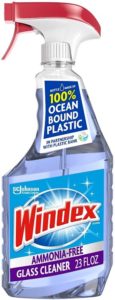
Windex Window cleaner can be used for many other things. This fantastic spray will simply make your cleaning task easy as it did mine. I walk around with this bottle in my hand on cleaning day. I am misting it on almost everything.
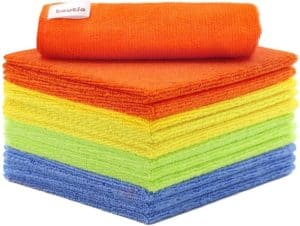
Using microfiber cloths for cleaning can dramatically reduce the number of cleaning products you use, saving you a lot of money in the long run.
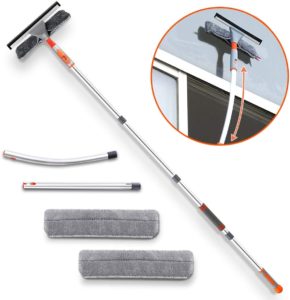
The rubber broom will never spray dirt at you and will help keep it where you want it. Designed for glass surfaces, leaves no dirt streaks and lines, so no soil remains trapped like with regular tools
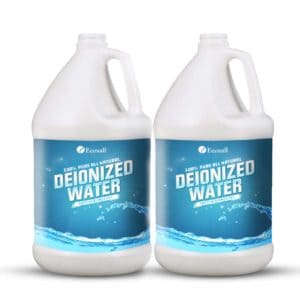
Solar panel glass is generally high quality, so only clean reverse osmosis deionized water and a little scrubbing will remove even the most stubborn grime. Make use of a soft brush attachment to ensure that no damage is caused to the glass, and your solar panels are left sparkling, spotless, and ready to crank out those kilowatts!
Maintenance for flexible solar panels
You can let nature take its course and let the rain take care of your
You can closely monitor your system’s performance by paying attention to your monthly consumption on a month-to-month basis. If you notice any lags in the system performance, it might be time to clean your installation.
Any fluctuations in your energy usage can be attributed to an urgent need for
If you discover that the efficiency levels are still acting up, it might now be time to call in a service specialist to look at your overall solar system and its performance.
A visual inspection is all you need to check if you require good scrub of solar panels other than cleaning with the rains. This all can be done without clambering on the ladder right on the ground.
The final word on solar panel cleaning
Cleaning solar panels is the same task as cleaning a house window. It is not energy-sapping and back-breaking either. Any neglect of the solar panels can lead to a noticeable efficiency drop.
You can self assess your solar system’s performance and self-diagnose the need for some good old elbow grease on the solar panels.
